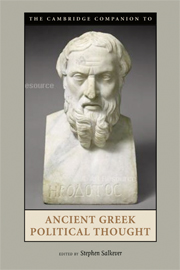Book contents
- Frontmatter
- Introduction
- 1 Homer and Political Thought
- 2 Foundings vs. Constitutions: Ancient Tragedy and the Origins of Political Community
- 3 Most Favored Status in Herodotus and Thucydides: Recasting the Athenian Tyrannicides through Solon and Pericles
- 4 Thucydides and Political Thought
- 5 “This Way of Life, This Contest”: Rethinking Socratic Citizenship
- 6 The Political Drama of Plato’s Republic
- 7 Practical Plato
- 8 Reading Aristotle’s Nicomachean Ethics and Politics as a Single Course of Lectures: Rhetoric, Politics, and Philosophy
- 9 Lived Excellence in Aristotle’s Constitution of Athens: Why the Encomium of Theramenes Matters
- 10 The Virtue Politics of Democratic Athens
- 11 Origins of Rights in Ancient Political Thought
- 12 The Emergence of Natural Law and the Cosmopolis
- Select Bibliography
- Index
11 - Origins of Rights in Ancient Political Thought
Published online by Cambridge University Press: 28 September 2009
- Frontmatter
- Introduction
- 1 Homer and Political Thought
- 2 Foundings vs. Constitutions: Ancient Tragedy and the Origins of Political Community
- 3 Most Favored Status in Herodotus and Thucydides: Recasting the Athenian Tyrannicides through Solon and Pericles
- 4 Thucydides and Political Thought
- 5 “This Way of Life, This Contest”: Rethinking Socratic Citizenship
- 6 The Political Drama of Plato’s Republic
- 7 Practical Plato
- 8 Reading Aristotle’s Nicomachean Ethics and Politics as a Single Course of Lectures: Rhetoric, Politics, and Philosophy
- 9 Lived Excellence in Aristotle’s Constitution of Athens: Why the Encomium of Theramenes Matters
- 10 The Virtue Politics of Democratic Athens
- 11 Origins of Rights in Ancient Political Thought
- 12 The Emergence of Natural Law and the Cosmopolis
- Select Bibliography
- Index
Summary
The concept of rights is a prominent feature of modern political thought. The principle that all human beings possess inalienable or imprescriptible rights was endorsed in the American Declaration of Independence (1776), the French Declaration of the Rights of Man and of the Citizen (1789), and the United Nations' Universal Declaration of Human Rights (1948). Previously, natural rights were central to influential political treatises by Hugo Grotius (1583-1645), Thomas Hobbes (1588-1679), Samuel Pufendorf (1632-94), John Locke (1632- 1704), and others. There is a growing consensus that the origins of rights theory can be found in the later Middle Ages, with Marsilius of Padua (c. 1280-c. 1343), William of Ockham (c. 1285-1349?), or Jean de Gerson (1363-1429), or still earlier with twelfth and thirteenth century canon lawyers such as Rufinus, Ricardus, Huguccio, and Alanus.
Some scholars view the rights tradition as reaching all the way back to the ancient Greeks and Romans, or even to the ancient Hebrew Bible, while others regard it as a strictly modern phenomenon, for example, Alasdair MacIntyre: “[T]here is no expression in any ancient or medieval language correctly translated by our expression 'a right' until near the close of the middle ages: the concept lacks any means of expression in Hebrew, Greek, Latin or Arabic, classical or medieval, before about 1400, let alone in Old English, or in Japanese even as late as the mid-nineteenth century.” This suggests that the issue involves, in part, the meaning of words.
- Type
- Chapter
- Information
- The Cambridge Companion to Ancient Greek Political Thought , pp. 301 - 330Publisher: Cambridge University PressPrint publication year: 2009
- 6
- Cited by

